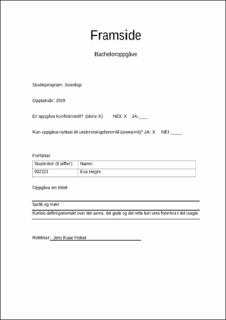| dc.contributor.advisor | Fisker, Jens Kaae | |
| dc.contributor.author | Hegre, Eva | |
| dc.date.accessioned | 2022-07-12T15:51:51Z | |
| dc.date.available | 2022-07-12T15:51:51Z | |
| dc.date.issued | 2022 | |
| dc.identifier | no.uis:inspera:109898158:48764774 | |
| dc.identifier.uri | https://hdl.handle.net/11250/3004746 | |
| dc.description.abstract | Definisjonar påverkar oppfatningane og handlingane våre, og eg har i denne oppgåva sett på definisjonsmakt som påverknadskraft. Skjult makt er mest effektiv, og med utgangspunkt i Bourdieu sitt omgrep symbolsk makt har eg undersøkt korleis definisjonsmakt kan vera forankra i det usagte. Eg har gjort ein retorisk analyse av utsegn der delar av argumentasjonen er underforstått, og eg har dermed nytta enthymem som viktigaste analyseverktøy. Det usagte i eit enthymem kan handla om fakta, allmenngyldige verdiar eller noko det er falsk semje om, og eg har omtalt det som det sanne, det gode og det rette. Dette har eg høvesvis kombinert med omgrepet kontekstuell kunnskap frå Haraway, med verdiordenar frå Boltanski og Thévenot og med sensemaking frå Weick. Slik har eg løfta fram ulike perspektiv og forståingsmåtar for empirien, som hovudsakleg er samfunnsdebattar om natur- og klimaspørsmål. Empirien er henta frå mellom anna ein TV-debatt, avisartiklar og Facebook-innlegg. Eg har plukka ut enkelte utsegn og formulert dei til syllogismar, som er komplett argumentasjon med to premiss og konklusjon. På denne måten har eg vist korleis me kan avdekka det usagte. Det som blir formulert og sagt høgt kan me forhalda oss til og diskutera, og slik kan me som fellesskap ta meir reflekterte val.
Stikkord: Definisjonsmakt, retorikk, enthymem, syllogisme, symbolsk makt, kontekstuell kunnskap, verdiordenar og sensemaking. | |
| dc.description.abstract | Definitions affect our perceptions and actions, and in this paper I have looked at the power of definition as an influential force. Hidden power is most effective, and based on Bourdieu's concept of symbolic power, I have examined how defining power may be rooted in the unspoken. I have made a rhetorical analysis of statements where parts of the argument are implied, and I have thus used enthymem as the most important analysis tool. The unspoken in an enthymem can be about facts, universal values or something there is false agreement about, and I have referred to it as the true, the good and the right. I have respectively combined this with the concept of contextual knowledge from Haraway, with economies of worth from Boltanski and Thévenot and with sensemaking from Weick. In this way, I have highlighted different perspectives and ways of understanding the empirical data, which are mainly public debates on natural and climate issues. The empirical data is taken from, among other things, a TV debate, newspaper articles and Facebook posts. I have picked out some statements and reformulated them into syllogisms, which are complete arguments with two premises and a conclusion. In this way I have shown how we can uncover the unspoken. What is formulated and said aloud we can relate to and discuss, and so we as a community can make more reflective choices.
Keywords: Defining power, rhetoric, enthymem, syllogism, symbolic power, contextual knowledge, economies of worth and sensemaking. | |
| dc.language | nno | |
| dc.publisher | uis | |
| dc.title | Språk og makt. Korleis definisjonsmakt over det sanne, det gode og det rette kan vera forankra i det usagte. | |
| dc.type | Bachelor thesis | |
